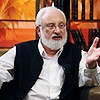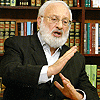Audio Version Of The Blog – 6/19/22
Listen to an Audio Version of the Blog
Download:MP3 Audio

Listen to an Audio Version of the Blog
Download:MP3 Audio

Michael Laitman, On The Times of Israel: “Defiant Israeli Tourists Ignore Warnings”
The Israeli character loves risks. It makes every daring experience like a movie full of action, filled with inexplicable pleasure, and provides a sting without which there is no feeling of life. It explains why despite the stern travel warnings and frequent reports of thwarted Iranian assassination attempts of Israeli citizens visiting Turkey, particularly Istanbul, thousands of Israelis continue traveling to that destination.
But one must act wisely and not ignore warnings, just as it is written: “A man should never stand in a place of danger and say that a miracle will be wrought for him, lest it is not.” (Babylonian Talmud). It is important to be careful.
Jews living in the Diaspora do not face this threat hovering over Israeli tourists with the same intensity. I remember when I was in Germany and England during periods when the Jews were targeted and warnings were given about potential antisemitic attacks. I saw whole families with small children walking in public with a carefree attitude, with yarmulkes on their heads and Star of David pendants around their necks.
Even in modern-day Iran, Jews live quietly and modestly and the Iranians understand them and have lived by their side for generations. On the other hand, Israelis are easy prey, a prime target for Iranians who yearn to take revenge after accusing Israel for a series of assassinations of Iranian military officers and scientists in their country.
Israelis have become accustomed to living in a hate-filled atmosphere, in a conflict-ridden Mediterranean region, in a reality of constant danger, so the thought of “nothing will happen to me” is stronger than any real threat.
The travel warnings issued for Israelis traveling to Turkey also include other cities and regions of the world. Nevertheless, it has not prompted them to make significant changes. They are not acting out of impudence or from defiance to demonstrate “here we are in spite of everything,” but at their root there is a belief in good fate, forever.
The writer Leo Tolstoy described this with great sensitivity: “What is the Jew? … What kind of unique creature is this whom all the rulers of all the nations of the world have disgraced and crushed and expelled and destroyed; persecuted, burned and drowned, and who, despite their anger and their fury, continues to live and to flourish. What is this Jew whom they have never succeeded in enticing with all the enticements in the world, whose oppressors and persecutors only suggested that he deny (and disown) his religion and cast aside the faithfulness of his ancestors?!
“The Jew – is the symbol of eternity. … He is the one who for so long had guarded the prophetic message and transmitted it to all mankind. A people such as this can never disappear. “The Jew is eternal. He is the embodiment of eternity.”
The root of this deep feeling that exists in the soul of every Jew is the thousands of years of connection to the Upper Force, of belonging to eternity, the feeling that we are continuing together as a people forever and that we have an important and dedicated role, to become “a light unto nations.” While this thought does not exist in our consciousness, it is hidden within our hearts.
This eternal feeling and the connection to the Upper Force should be felt in the heart of every person in the world, not just in the subconscious of Israelis. But the world is approaching this feeling in its own way, through suffering and anguish. Day by day the world feels embroiled in deep crisis. People experience wars and plagues and life becomes insufferable.
As troubles intensify, the world will understand that it is impossible to continue in this way, in a state of separation and hatred, which is the source of all evil, and as a result humanity will strive to change for the better and act toward unity. What is expected from Israel is to lead the way to unity, and thereby serving as a role model.
[299219]
My new article on Linkedin “The Wealth of a Nation”

The full name of Adam Smith’s celebrated composition, The Wealth of Nations, is An Inquiry into the Nature and Causes of the Wealth of Nations. A few years ago, Israel found a wellspring that is bound to cause great wealth: natural gas, and plenty of it. To capitalize on the bonanza wisely, the state founded the Israeli Citizens’ Fund, a sovereign wealth fund that will see that sudden windfalls do not tilt the economy off balance. This month, the fund started releasing money into the market, and the race for the cash for grabs has started. To me, this is a sign that we are misusing it before we even started.
The wealth of a nation is not measured by its capital, and it is not increased by “invisible hands,” as Smith referred to the power of self-interest to benefit society. On the contrary, self-interest is so powerful today that it has become humanity’s chief destructive force.
Today, true, sustainable wealth is measured by the level of a society’s cohesion. If we are starting off by fighting over the spoils, then we are turning the boon into a bust. If wealth only increases our division, then it will also weaken us on every level, economic and otherwise.
Our valuable resources, especially in the State of Israel, are human resources, not financial or monetary resources. Instead of focusing on wealth, we should focus on social vitality, on what will make the people of our country thrive, and it is certainly not more money.
Connection will make us prosperous, create jobs, and cut unnecessary expenses (of which there are a great many). The “revenue” from these operations will bring in far more than any sovereign wealth fund can ever yield.
All of the problems we are facing, from soaring inflation through delayed shipments to food and semiconductor shortages, are symptoms of our social division and pervasive enmity between people. When we mend these, we will not only solve our social problems, but we will also heal our economy, and heal our relations with our neighbors, who are mocking our shows of dissension and despise us for our social disunity.
 Michael Laitman, On Quora: “How objective can perception be?“
Michael Laitman, On Quora: “How objective can perception be?“
Objective means having no self, national or even global interest, but that we direct ourselves solely at the purpose of the higher nature.
We should constantly calibrate ourselves to be objective, i.e. to be free of whatever we feel at a given moment, as if we are machines receiving certain impressions in the most objective ways possible. Otherwise, we receive in the direction of whether something is good or bad for us, i.e with the question “What will I get out of it?” After calibrating ourselves to be free of what we feel at any given moment, whether or not it makes us feel good or bad, we will then have correct interactions with people and other aspects of nature on the still, vegetative and animate.
We have to bring ourselves to states where we identify that in relation to ourselves, we have a self-aimed intention to receive, and that we should give it no consideration. We do not want to become judges lured by bribery because of a certain kind of pressure.
It is written that “the judge has only what his eyes can see.” The eyes are key here—not memories, impressions, prejudice or anything else. It is as if we take a picture of a certain person without any connection to emotion, to ourselves, our nation, or even our world. This is how we can be judges.
When we calibrate ourselves to be objective in such a way, then it is considered that we truly wish to be as judges. It is a very exalted place, because we have nothing of our own. In such a state, we can reach a state where we start perceiving an independent reality and how it behaves for a higher purpose.

Based on the video “How to Calibrate Yourself Toward Objective Perception” with Kabbalist Dr. Michael Laitman and Yael Leshed-Harel. Written/edited by students of Kabbalist Dr. Michael Laitman.
My new article on Linkedin “UNRWA – Feeding the Fire of Hate”

UNRWA is the United Nations Relief and Works Agency for Palestine Refugees in the Near East. It was established on December 8, 1949, and began to operate on May 1, 1950. Its mandate has been obscure from the very beginning, though it did mention relief for Palestine refugees.
In discussing its mandate, an official document published by UNRWA offers a rather vague explanation: “Attention is devoted to the evolution of some aspects of the Agency’s mandate, in particular human development and protection.” Subsequently, the article concludes with some remarks on the overall nature of UNRWA’s mandate, without specifying what those really are.
Given that every three years the mandate must be renewed, and that it was never actually defined, the organization grew beyond all proportions and became a behemoth that spends hundreds of millions of dollars, mainly on schools in Gaza and the Palestinian Authority. In fact, “Over half of the 2020 Programme Budget of US$ 806 [sic] million is earmarked for education under the priority that ‘school-aged children complete quality, equitable and inclusive basic education,’” according to the organization’s own statement.
The problem is that what UNRWA defines as “inclusive basic education” is actually a hate campaign against Israel, Israelis, and Jews. These hundreds of millions of dollars go toward feeding the fire of hate in the most volatile area in the world. Recently, the racist content has become so defamatory that even the EU Parliament, not exactly one of Israel’s guardians in the international community, condemned the organization.
The irony is that despite the hate campaign, the squandering of nearly a billion dollars every year, and its complete incompetence when it comes to actually helping refugees, the EU, as does the UN, the US, and the rest of the world, continue to fund UNRWA. Just recently, the EU voted to give UNRWA another boost worth hundreds of millions of dollars.
After decades of warnings about the inappropriate use of funds by UNRWA, we must finally accept that the organization’s use of funds is squarely within the boundaries of the nations’ intent. In other words, they have no problem with its support of antisemitic teachings because it expresses their opinions.
Worse yet, in the coming years, we should expect more and more such “aid” and “human rights” organizations to emerge out of the blue, and all of them will focus on one and only target: condemning, and eventually delegitimizing the existence of the State of Israel.
The only possible solution to the problem is not political, but spiritual. That is, the proliferation or lessening of anti-Israel and antisemitic organizations depends on the spirit of the Israeli people, and specifically our social cohesion. The more united we are, the greater the solidarity between us, the less powerful and successful these organizations will become.
For decades, the State of Israel has been trying to fight the incitement against it. For decades, matters have gone from bad to worse. Were it not for US vetoes, the sanctions against Israel would have made life very difficult for Israelis long ago. In recent years, there has been a growing tendency in the US, too—with the exception of the Trump administration—to lean more toward the Arabs and less toward Israel. In such a state, soon there will be no one protecting Israel in the UN Security Council and sanctions will start landing on the Jewish state.
However, Israel can reverse the trajectory. If it unites its ranks, its unity alone will turn the antagonism toward it into sympathy. We need not explain anything to anyone; we only need to show that we are one nation, united above all our divisions and disagreements. This is what the world needs to see from Israel, and this is what will legitimize our presence in the land of our fathers.
[299216]

Michael Laitman, On The Times of Israel: “Why Iran Gets Away with Anything”
The International Atomic Energy Agency (IAEA) has recently admonished Iran for not cooperating with the agency after traces of uranium were found in several sites in Iran. In response, Iran disconnected some of the IAEA surveillance cameras that the agency uses to monitor Iran’s nuclear activity. The world condemned Iran for this move, of course, but no action has been taken to prevent its ongoing enrichment efforts, which, according to Western sources, have nearly reached the level that enables Iran to create nuclear weapons. Israel, on the other hand, which makes every effort not to break humanitarian laws in its own conflict, is almost unanimously deviled around the world.
Why does the world hate Israel and not Iran? How can Iran get away with production of nuclear weapons, while Israel is under constant bombardment of condemnations, with on-going committees and delegates whose sole purpose is to find Israel’s faults in its conflict with the Palestinians, delegates and committees with explicit orders to ignore the Palestinian terrorist acts against Israel and even against their own people?
The answer to all these questions is simple: Israel is not Iran. Even when Israel does something good, such as setting up makeshift hospitals for wounded Syrian refugees or sending rescue teams to disaster sites around the world, Israel is still vilified. No one expects Iran to be good to anyone, while all the good that Israel does is never nearly enough.
As unpleasant as this may be for us, I understand why the world treats us this way. Subconsciously, the world feels what we need to be doing, and setting up makeshift hospitals is not one of them. It is great that we do this, and it does help those who need medical services and cannot get them otherwise, but this should not be Israel’s main focus. This is not what the world expects from us, and not what we should expect from ourselves.
We can tell ourselves a thousand stories about how kind we are, what great donors we are, how we help the sick and wounded the world over, and how Israeli agriculture creates food in poor third world countries. We can tell these things to ourselves but no one else listens or accepts them. All we need is to look at the world’s opinion about us as is reflected in UN votes and how the very countries that we help vote against us every chance they get.
I cannot help but justify them; this is not what we should be giving them, and they sense it and react accordingly. What they really need from us, and this may be counterintuitive, is for us to treat each other well, our fellow Jews. Deep down, they feel that our internal division is the culprit behind their woes, and even their own internal conflicts.
The world does not expect us to reverse desertification or cure cancer. It expects much more from us: to reverse hatred around the world. And it expects us to set an example, a living proof that unity above division is possible.
Being “a light to the nations” means that we are a beacon of hope that humanity can overcome strife. After all, it was our king, the wisest of all men, King Solomon, who coined the motto, “Hate stirs up strife, and love will cover all crimes” (Prov. 10:12).
We need to understand that the seemingly insurmountable antagonism and profound alienation among the various factions of Israeli society are purposefully so. These chasms are not meant to be bridged by negotiation or by arrival at some compromise. They are meant to stay as they are, and to realize that our task is not to agree, but to remain one nation even though we disagree. This is the example we must show the world. It is the only thing humanity cannot develop by itself, and the only thing that it expects Jews to establish.
Our ancestors set the precedent. At the foot of Mt. Sinai, we pledged to unite “as one man with one heart,” after which we were declared a nation. Our only merit at the time was our unity, our mutual responsibility. That one merit was the reason we became a chosen nation.
If we live up to our calling, we will be admired and emulated the world over. If we collapse under the burden of hate, we will be deviled, ridiculed, and eventually banished or exterminated.
[299147]
 Michael Laitman, On Quora: “Should I size up people when I meet them?“
Michael Laitman, On Quora: “Should I size up people when I meet them?“
When we meet someone, we hold two images within: One is our impression of the person we meet, and the other is our own image. We then start comparing how much our thoughts, desires and expectations meet what we want in relation to this stranger. In other words, we meet an image of a person, and picture them within ourselves in a certain way for the time being. Later, we might change how we view them.
We stand in front of a picture that we depict within. First of all, it is not the person as they are, but the way we depict them within ourselves, i.e. it could be very far from how things really are, and perhaps we are prejudiced on the matter, and so on.
We then start working with the image that forms within us. We do not relate to the person who is in front of us, because we do not actually see them. We see them to the extent in which we depict them within.
We then start interacting with this image. That is, we influence the person and feel how they influence us. Accordingly, we examine whether we formulated this image correctly to begin with or not.
Throughout the interactions we have toward each other, we constantly adjust our opinion about the other person, whether or not they are better or worse than the image we had of them, and where they fit in terms of several areas that interest us, for example, in terms of politics, education, culture, their outlook on life, and so on.
There are many parameters by which we examine people, and the impression we receive in relation to these parameters gives us an image of a person whom we meet and interact with. That image constantly changes, acquiring a new shape and form.

Based on the video “What Happens When You Meet Somebody?” with Kabbalist Dr. Michael Laitman and Yael Leshed-Harel. Written/edited by students of Kabbalist Dr. Michael Laitman.
Photo by kabita Darlami on Unsplash.
 Question: Are there any punishments from past incarnations? Is there such a thing that a person drags baggage because of some bad deeds in past lives?
Question: Are there any punishments from past incarnations? Is there such a thing that a person drags baggage because of some bad deeds in past lives?
Answer: In principle, yes because our material life and death do not end anything and do not start anything. We should perceive this reality as a continuous movement of our spiritual ascent to the Creator.
Question: And vice versa, are there any merits that give me easier development in my next lives? Even the Torah speaks of the merits of the forefathers.
Answer: I wouldn’t say it’s easier, but more effective.
Question: In general, is it fair that a person gets punished for some past lives when it is unclear who lived there?
Answer: But they’re yours.
Comment: But I don’t feel that way.
My Response: It doesn’t matter. This is done on purpose so as to not free you from any problems or impose them on you. All this is considered and very clearly comes out of the global governance system. It’s not just some kind of whim or accident or that the human body is independently created in this way.
[298881]
From KabTV’s “Spiritual States” 5/31/22
Related Material:
Punishment Is Not What We Think
Spiritual Punishment
Punishment For Bad Deeds
 Question: Sometimes a person feels that he did something wrong and immediately received punishment, and vice versa, that he did something good and immediately received some kind of reward. But in most cases, there is no such direct connection; it is concealed. Why is one not shown directly that there is punishment for bad deeds?
Question: Sometimes a person feels that he did something wrong and immediately received punishment, and vice versa, that he did something good and immediately received some kind of reward. But in most cases, there is no such direct connection; it is concealed. Why is one not shown directly that there is punishment for bad deeds?
Answer: A person is not shown anything at all except what he needs to know for his next correct action. This is how he is led through life.
If he does not understand this and does not feel this, then the problem is in him. In this case, to the extent that he does not feel that he allegedly made a mistake, the mistake itself gradually leads him to some better results.
Everything is arranged so we would move forward by trial and error.
[298786]
From KabTV’s “Spiritual States” 5/31/22
Related Material:
The Secret Of Happiness
Learning About Life
Happiness Pill
 Question: There are a huge number of people around me in this world. Some of them are talented, rich, and happy, and some, on the contrary, are poor, unhappy, and sick. I really feel like saying that the former people were rewarded by the Creator and the latter were punished. Is it right to reason this way?
Question: There are a huge number of people around me in this world. Some of them are talented, rich, and happy, and some, on the contrary, are poor, unhappy, and sick. I really feel like saying that the former people were rewarded by the Creator and the latter were punished. Is it right to reason this way?
Answer: But these are your judgments. How do you know what the reward and punishments are? How do you know the absolute meaning of the Creator’s relation to man?
Even the Torah says: “He, who does not beat his son, hates him.” What is meant is not actual beatings, but the fact that you have to put pressure on him to make a man out of an animal.
Question: So, if a person does not see the entire program of creation, he cannot, at a certain stage of his development and all of mankind’s, draw conclusions about reward and punishment, right?
Answer: No, in no way! For this, we are given lists of instructions that we can align ourselves with. Although we have not yet grasped their truths, we can still concentrate on them.
Question: Is the problem that everyone understands them in their own way?
Answer: It really depends on how developed a person is. But this is precisely the point of these lists, that a person is mistaken to the extent that he does not merge with them, to the extent that he does not comprehend the instructions.
[298836]
From KabTV’s “Spiritual States” 5/31/22
Related Material:
Only If The Creator Helps
Becoming Integrated With The Program Of Creation
Every Person Must Become The Author Of Creation